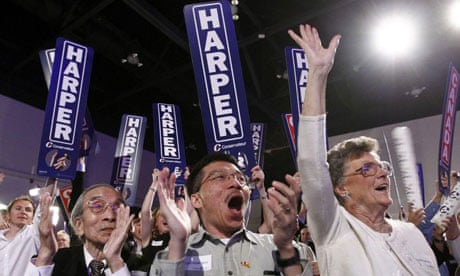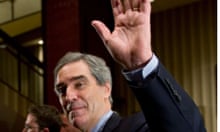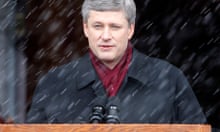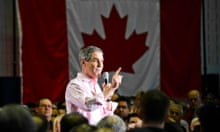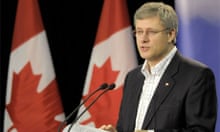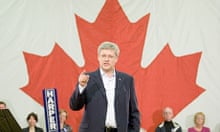The Conservative prime minister of Canada, Stephen Harper, has won a majority for his government in the country's parliamentary elections that also marked a shattering defeat for Michael Ignatieff's opposition Liberals.
In another significant shift, the leftist New Democrats are projected to become the main opposition party for the first time in Canadian history with 106 seats, in a stunning victory over the Liberals, who have always been either in power or leading the opposition.
The leader of the Green party, Elizabeth May, was also elected to parliament on Monday, marking the first time a member of the environmental party has won a federal election in North America.
The Greens put up candidates across Canada, but focused their efforts on getting May elected to ensure they had at least a small voice in the House of Commons. "Today we proved that Canadians want change in politics," May told her supporters.
Harper, who took office in 2006, has won two elections but until now had never held a majority of parliament's 308 seats, forcing him to rely on opposition support to pass legislation.
While Harper's hold on the 308-member parliament has been tenuous during his five-year tenure, he has managed to nudge an instinctively centre-left country to the right. He has gradually lowered sales and corporate taxes, avoided climate change legislation, promoted Arctic sovereignty, upped military spending and extended Canada's military mission in Afghanistan.
Elections Canada reported preliminary results on its website, giving the Conservatives 164 seats, which will mean a fixed four-year term of uninterrupted government for Harper.
"It's stunning. We're elated," Conservative Jason Kenney said in an interview with CBC. "We'll be a government for all Canadians."
Former colleagues of Harper say his long-term goals are to kill the image of the Liberals, the party of Jean Chrétien, Lester Pearson and Pierre Trudeau, as the natural party of government in Canada, and to redefine what it means to be Canadian.
Harper took a major step toward that on Monday night as the Liberals dropped to 35 seats from 77, according to the preliminary results.
The Liberal leader, Michael Ignatieff, congratulated Harper and New Democrat leader Jack Layton and accepted responsibility for the "historic defeat".
"I will play any part that the party wishes me to play as we go forward to rebuild," Ignatieff said.
Stephen Clarkson, professor at the University of Toronto, said Harper will now be considered a transformative figure in Canadian history. "It's a sea change," Clarkson said.
The New Democrats' gains are being attributed to Layton's strong performance in the debates, a folksy, upbeat message and a desire by the French-speakers in Quebec, the second most populous province, for a new face after growing weary of the separatist Bloc Quebecois.
The NDP's gains marked a remarkable shift in a campaign that started out weeks ago looking like a straight battle between Harper and Ignatieff, with the 60-year-old Layton recovering from prostate cancer and a broken hip.
Harper had campaigned on a message that the New Democrats stood for "higher taxes, higher spending, higher prices, protectionism". He called the election a choice between "a Conservative majority" and "a ramshackle coalition led by the NDP that will not last but will do a lot of destruction".
